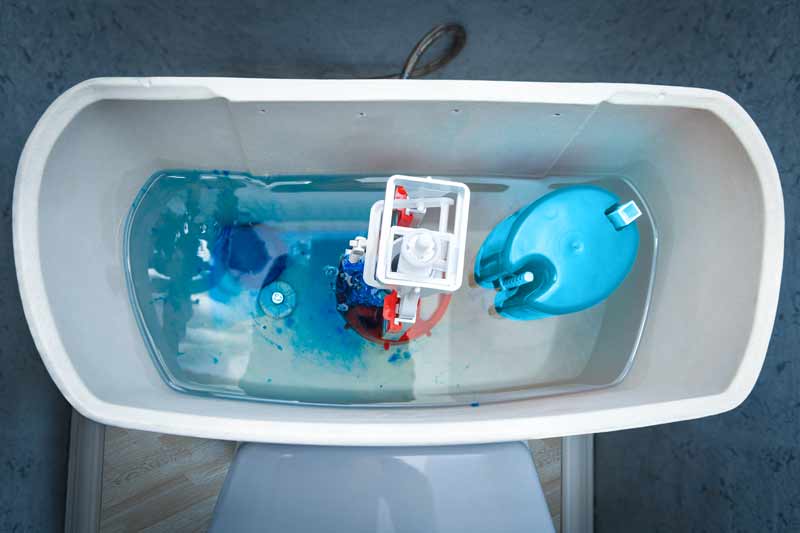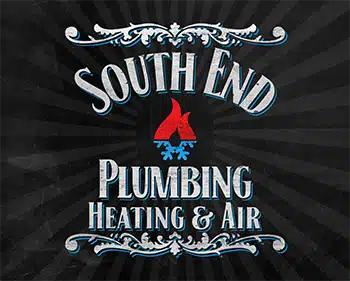Avoiding Toilet Tank Cleaning Chemicals That Damage Rubber Components
South End Plumbing, Heating, & Air Expert Tips

Chemicals in Toilet Tank That Can Damage Rubber Components
Avoiding Toilet Tank Cleaning Chemicals That Damage Rubber Components
Maintaining a clean and fresh toilet is essential for a hygienic bathroom environment. While cleaning chemicals can be effective in tackling stains and odors, it’s important to be cautious about the products you use in your toilet tank. Certain cleaning chemicals can deteriorate the rubber components inside the tank, such as the flapper and other seals. In this article, South End Plumbing, Heating, and Air will shed light on the cleaning chemicals that can harm these rubber parts and offer alternative methods to keep your toilet clean without causing damage.
Understanding the Impact of Cleaning Chemicals on Rubber Components: Rubber components, including the flapper, gaskets, and seals, play a critical role in maintaining the proper functioning of your toilet. These rubber parts create a watertight seal and ensure the efficient flushing and refilling of the tank. Unfortunately, certain chemicals can cause rubber deterioration over time, leading to leaks, inefficiency, and costly repairs.
Chemicals to Avoid in Your Toilet Tank:
- Chlorine Tablets: Chlorine tablets are commonly used to sanitize and disinfect toilet bowls. However, placing them directly in the tank can cause the rubber flapper to deteriorate rapidly. The chlorine’s corrosive properties gradually weaken the rubber, resulting in a faulty flapper that may not seal properly, leading to water wastage and continuous refilling of the tank.
- Bleach Tablets: Similar to chlorine tablets, bleach tablets can have a corrosive effect on rubber components. The continuous presence of bleach in the tank can weaken the flapper and other seals, leading to leaks and an inefficient flushing mechanism.
- Blue Dye Tablets: Some toilet tank cleaning products contain blue dye intended to provide a fresh appearance to the water. However, these tablets often contain corrosive chemicals that can harm rubber parts. The prolonged exposure to these chemicals can cause the flapper to lose its elasticity, resulting in leaks and frequent repairs.
Alternative Methods for Cleaning Your Toilet Tank:
- Vinegar and Baking Soda: A natural and effective alternative to chemical cleaners is a mixture of vinegar and baking soda. Start by pouring one cup of vinegar into the tank, allowing it to sit for a few minutes. Then, sprinkle one cup of baking soda around the inside of the tank. Use a toilet brush to scrub the tank walls and components gently. Finally, flush the toilet to rinse away the mixture.
- Mild Dish Soap: Another safe option for cleaning your toilet tank is mild dish soap. Add a small amount of dish soap to a bucket of warm water and mix well. Dip a sponge or cloth into the soapy solution and clean the inside of the tank, including the flapper and other rubber parts. Rinse thoroughly with clean water.
- Regular Maintenance: Establishing a regular maintenance routine can prevent the buildup of stains, mineral deposits, and odors in your toilet tank. This includes periodic cleaning of the tank, inspecting rubber components for wear and tear, and addressing any issues promptly to avoid further damage.
Conclusion: Maintaining a clean toilet is important, but it’s equally crucial to be mindful of the cleaning chemicals used in your toilet tank. Chlorine tablets, bleach tablets, and blue dye tablets can damage the rubber components, leading to leaks and inefficiencies. Instead, opt for alternative methods like vinegar and baking soda or mild dish soap for safe and effective cleaning. Remember to incorporate regular maintenance practices to ensure the longevity and proper functioning of your toilet. If you encounter any toilet-related issues or require professional assistance, South End Plumbing, Heating, and Air is here to provide reliable plumbing services. Let’s prioritize the health of your toilet while protecting its essential rubber components.
Last Updated on 20th July 2023 by South End Plumbing, Heating, and Air Specialist
